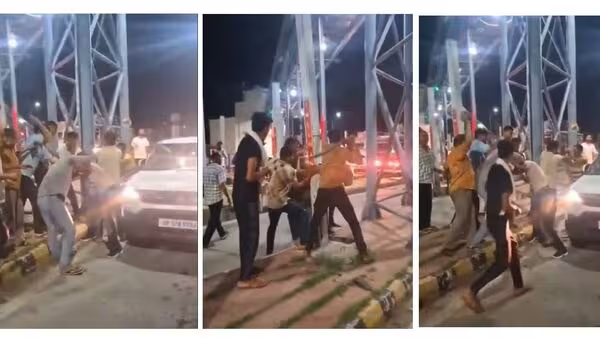August 17, 2025 Meerut, Uttar Pradesh, witnessed a disturbing incident on the night of August 17, 2025, when an Indian Army jawan was tied to a pole and beaten by toll plaza staff at the Bhuni Toll Plaza on the Meerut–Karnal Highway. The soldier, identified as Lance Naik Kapil Singh of the Rajput Regiment, was returning to duty in Srinagar after his leave. The brutal attack was caught on CCTV cameras and quickly spread across social media, sparking nationwide outrage.
What Led to the Assault?
Kapil Singh was reportedly rushing to Delhi to catch a flight to Srinagar. Facing a long queue at the toll plaza, he showed his Army identity card and requested a quick passage. Instead of accommodating him, the toll workers allegedly picked a quarrel, tied him to a pole, and thrashed him with sticks and rods. His Army ID card was reportedly snatched during the scuffle.
For many, this incident was not just an assault on an individual but a grave insult to the dignity of the Indian armed forces, who are widely respected across the country.
Who Was Involved?
- Victim: Lance Naik Kapil Singh, 26, of the Rajput Regiment, a native of Gotka village in Meerut.
- Accused: At least seven toll plaza workers have been arrested so far. Their names include Sachin, Vijay, Anuj, Ankit, Suresh Rana, Ankit Sharma, and Neeraj alias Bittu. Some of the accused have a reported criminal background.
- Agencies: The National Highways Authority of India (NHAI), the Uttar Pradesh Police, the Indian Army, and even the National Human Rights Commission (NHRC) have stepped into the matter.
Swift Action by Authorities
Police Action
The Uttar Pradesh Police quickly registered an FIR under serious charges including attempt to murder, unlawful assembly, and robbery. Six accused were arrested within hours, and more arrests followed.
NHAI’s Response
The NHAI imposed a ₹20 lakh penalty on the toll-operating agency, M/s Dharam Singh Company, and has begun the process of cancelling its license. The company has also been barred from future tenders. NHAI officials called the assault a “grave breach of contract and trust.”
Army’s Reaction
The Indian Army’s Central Command strongly condemned the incident, posting on social media that the Army “remains committed to ensuring justice” and will pursue the case “to its logical conclusion.”
NHRC Oversight
The NHRC also took suo moto notice, stating that tying a soldier to a pole and beating him amounts to a severe human rights violation. Authorities have been asked to submit an action taken report within two weeks.
Public Anger and Protests
The shocking video of the assault quickly went viral, triggering widespread public anger. Locals and villagers marched to the toll plaza, vandalised booths, and demanded justice. Protesters declared the toll stretch “toll-free” and demanded:
- Removal of all accused staff from duty
- A permanent 10-km toll-free zone around Bhuni village
- Public listing of all exempted villages
The protests turned violent at times, forcing the deployment of heavy police forces to control the situation. By the next day, normalcy was restored, but public anger remained high.
Current Status of the Soldier
Thankfully, Kapil Singh survived the ordeal and is reported to be in stable condition after medical treatment. His family, however, has called for the strictest possible punishment for the accused. His father, speaking to the press, said:
“Our son serves the nation. To be treated this way in his own village is unacceptable.”
Why This Case Matters
The Meerut toll plaza assault has raised important questions:
- Safety of soldiers during travel: Why are military personnel, often on urgent duty travel, exposed to such risks?
- Accountability of toll operators: Should toll contractors face stricter screening and monitoring?
- Respect for uniform: How could employees entrusted with public service treat a serving soldier with such disregard?
The incident has also reignited debates on toll plaza management in India, where frequent disputes and mismanagement have been reported.
Looking Ahead
The Meerut assault case is being closely monitored by police, the Army, and national authorities. With arrests made, fines imposed, and contracts under cancellation, this case may set a precedent for stricter accountability at toll plazas nationwide.
For now, the people of Meerut, and indeed the country, are demanding justice for Kapil Singh a soldier who was attacked not on the battlefield, but in the heart of his own homeland.
Conclusion
The Bhuni Toll Plaza assault has become more than just a local crime story. It is a stark reminder of the importance of discipline, accountability, and respect in public service roles. The Army, NHAI, police, NHRC, and the public have all stepped in, signalling that justice will not be delayed. As investigations continue, the incident could lead to long-term changes in toll plaza operations and stronger protections for service personnel across India.


